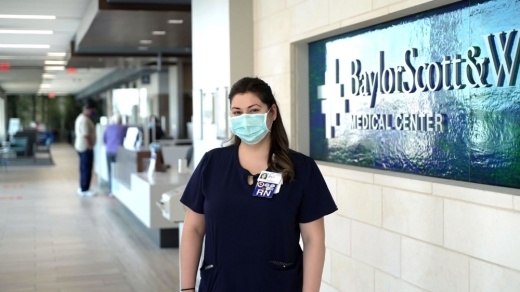According to Diana Brodeur, vice president of JPS Health Network—Tarrant County’s taxpayer-supported hospital district—JPS has been experiencing staffing shortages and is down 288 nurses.
“The JPS Nursing team is extremely proactive—they are experts at managing the constantly changing care needs of our community," Brodeur said. "That’s not to say this isn’t incredibly hard. Anything the community can do to ease the pressure the pandemic is putting on already busy hospital systems is what’s needed now."
Staffing challenges at JPS facilities are not unique, either.
“Our staff is fatigued, they have been at this for over 18 months,” said Steve Love, president and CEO of the Dallas-Fort Worth Hospital Council. “We’ve got professionals [who are] just leaving, saying, ‘We’ve had enough, we’re gonna change careers, we’re burnt out completely.’ And you’ve got to realize, as you look at our capacity issues, you’ve got to match the staff.”
With the community spread level back to high for Tarrant and Denton counties, the delta variant of COVID-19 has forced many hospitals to fill up all ICU beds and pause elective surgeries.
The Dallas-Fort Worth Hospital Council reported on Aug. 19 that Tarrant County had 20 staffed adult ICU beds and Denton County had five.
The council is also reporting two available staffed pediatric ICU beds in Trauma Service E, which includes Tarrant, Dallas, Collin and Denton counties, as hospitals are also seeing an unusually high number of RSV patients.
To assist with the need for additional staff, Texas Department of State Health Services staff announced Aug. 11 the state will resume filing requests for medical surge staff that “cannot be met locally.” According to the statement, the agency will be recruiting staff from out-of-state to assist hospitals and health care facilities reaching capacity.
In a statement, Baylor Scott & White Health said the system has been sourcing staff to combat the shortage, using multiple resources.
“We have received notice from the state that we will be allocated additional nurses and respiratory therapists. The arrival dates of the state resources are yet to be determined. We are very thankful for the resources, and we look forward to welcoming the additional medical personnel who will soon be available,” Baylor Scott & White Health representatives said in a statement.
Matthew Eiserloh, director of community and public relations for Medical City Alliance, said the health care system hired 25 new nursing interns in the last two months to assist with the increased number of cases they have also seen.
Brodeur said the JPS system's request for nurses was granted, and they expect to receive 30 nurses and eight respiratory therapists.
Health officials are linking the majority of cases to unvaccinated patients, who are being treated for severe illness resulting from the virus. As of Aug. 18, DSHS reports only 52% of all Tarrant County residents above the age of 12 are fully vaccinated. In Denton County, around 58% of the population above the age of 12 is fully vaccinated.
Love said around 45% of adults in the ICU have COVID-19, and the majority of those cases are unvaccinated individuals.
“You got to make sure you have the staff to service the beds, and you're treating not only COVID patients—you’re treating non-COVID patients,” Love said. “You still have people having heart attacks and strokes and the need for surgery and those kinds of things. So it's a complex way of looking at staffing, looking at skill sets and matching it to the patients you have within your hospital.”
Although the number of available ICU beds for both adults and children continues to decrease, Love said individuals needing medical attention or experiencing symptoms of COVID-19 should still come to their hospital to get treatment.
“There are ways hospitals, in a real critical search situation, can flex up a little bit—they can go to recovery rooms and look at some of the equipment there and do makeshift ICU beds, etc,” he said. “So looking at that metric is important, because it's showing you that we're having volume increases at our hospitals. But I do not want to create panic, where people think that we're not going to serve a pediatric patient. We're going to do everything we can to try to give them the best [care].”





